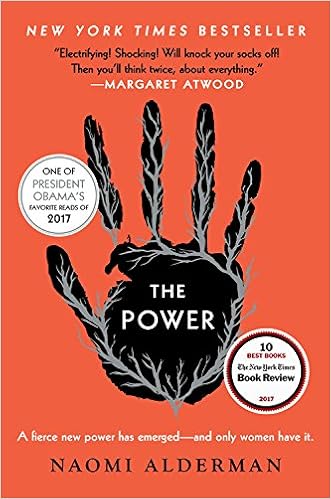Since its release in 2016, Naomi Alderman’s The Power has been impossible to miss, receiving accolades from the New York Times and President Barack Obama, among many many others. The premise is that women — through a new organ called a skein, located at their collarbones — suddenly become more physically powerful than men, able to transmit strong jolts of electricity. Things go downhill pretty quickly.

I resisted The Power because I am tired of power and the things people do to keep it. 2016 was the year Alton Sterling was killed in my home state. 2016 was the year I woke up at three in the morning and learned that white America had elected Donald Trump to the presidency. 2016 was already a terrifying real-life master class in the ways power corrupts morality; it was not my opinion that I needed a fictional one, as well.
But time passed, and I got used to this new reality (which I’m perennially angry with myself for, which is stupid because that’s how humans are, but also what is wrong with me and how could anyone get used to this?), and my friend Renay said The Power was really good though flawed, and what can I say? I like a book with ambition. The Power has ambition. Naomi Alderman wasn’t just writing a story about gender — in fact, Renay argues (I think rightly!) that she wasn’t writing about gender at all — but about the downfall of a society that cannot reconcile itself to a new balance of power. The characters in The Power would rather see everyone die, than change. It’s a message that resonates deeply under this presidency.
As a narrative, The Power succeeds brilliantly: It’s tense, engaging, propulsive. You have to keep reading to find out what happens next, even though what happens next is inevitably terrible. The four central characters — Margot, Allie, Roxy, and Tunde — all begin as very recognizable humans. One becomes a prophet, and one an international crime boss, and one a world-renowned journalist / refugee and one a world-changing politician; and it’s a tribute to Naomi Alderman that she makes their journeys (generally) believable.
Yet for all the ambition of the premise, The Power leaves out huge, crucial swathes of human experience in favor of staying within a white, cis, straight comfort zone. Though we’re told that two of the four main characters are people of color, the intersections of race and gender are barely explored. Though Alderman does consider the differing responses in different countries, such as riots in India where women protest sexual harassment, or uprisings in Moldova by trafficked women, she depicts few, if any, divides along racial and religious lines. To the best of my recollection, nobody ever addresses the fact that the renowned prophetess Mother Eve is mixed race. Nor (again to the best of my recollection) does the right-wing backlash — mostly glimpsed through their writings, and never point-of-view characters — launch racist or homophobic attacks. It’s all gender.
Despite the apparent tight focus on gender, Alderman includes no gay or trans characters. There’s a guy character who happens to have a skein, which the book describes as rare, but apart from him we don’t see any of the implications of the premise for sexuality or gender identity. It’s also, frankly, wild to me that in a book where many many characters discuss not needing the majority of men (just a few with good genes for procreation), not one single person talks about queer female sexuality.
These are, I think, real failures of imagination. I would also have liked to see Alderman create a society that was more than a mirror image of the one we have now. While I strongly agree with the premise that women in power would be as susceptible as men to corruption and moral turpitude, I don’t think that the forms that corruption would take would be identical. But in The Power, women do to men all the exact things men have done to women, and in the exact same format and using the exact same language. Alderman depicts this well, convincingly. I just don’t think it’s what would happen. I think it would look different. But this falls under the heading of I wish this book had been attempting a very different project, more than proper criticism.
My final gripe — I swear I enjoyed this book though! — comes with a content warning for childhood sexual abuse. I was uncomfortable from the start with Alderman’s depiction of Allie / Mother Eve as a survivor of childhood sexual abuse. I didn’t like the depiction of her as sinister and calculating and nearly incapable of forming genuine connections. Even more maddening, at the end of the book, there’s a reveal that I’m going to spoil because it made me so angry: Allie/Eve learns that the foster father she killed for sexually abusing her was acting at the behest of the foster mother. It’s meant, I think, to be the final twist of the knife that tips Allie into believing the human race is not worth saving. Sexual trauma as plot twist is boring, and lazy, and exploitative. Let’s stop with it, yeah?
Basically I had a ton of thoughts and feelings about the book, and I bet you did too, and I’d love to hear what yours were! Get at me in the comments or on Twitter, because I really want to talk about this book!
Edit to add: My clever friend Jeanne pointed out that the book is fundamentally a satire — very true, and probably the reason I was dissatisfied with some of the worldbuilding. Her review is here.